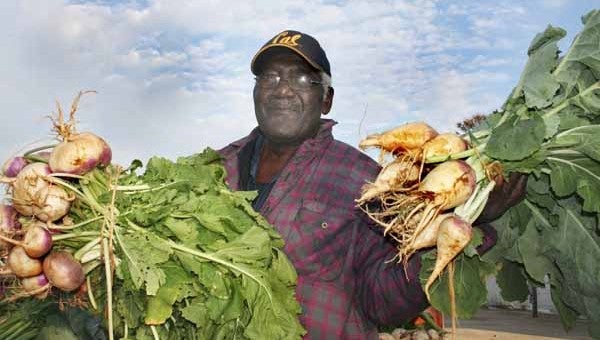Carroll Foster: the local expert on greens
Published 11:00 pm Monday, November 19, 2012
Ask Carroll Foster about greens and he’ll tell you how to cook a mess or how to cook enough to feed a log rolling.
He just might be the county’s expert on greens. And this time of year, folks come around asking his advice on how to cook greens of every kind.
“I’ve been growing collard greens and turnip greens as long as I can remember,” Foster said. “I grew up on the farm and we grew what we ate and I’ve been growing greens ever since.”
Even today, Foster said he and his wife don’t eat any vegetables that they don’t grow at their place in Shiloh.
“Folks put all kinds of fertilizer on their vegetables so you don’t know what you’re eating,” he said. “We make our own fertilizer out of leaves from the pecan and oak trees around the house and add some chicken litter. So, we know what’s making our vegetables grow.”
Foster specializes in rutabagas and mustard as well as turnips and collards.
“As for me, I like rutabagas more than any other greens,” he said. “Other folks would like them too if they tried them. Most folks don’t know that you can cook the rutabaga greens, just like you can cook turnips greens. And, to me, there’s nothing better than rutabagas.”
Foster said history plays a big part in what folks cook and how they cook it.
“Mostly, women folk cook the way their mamas and their grandmas cooked, so that’s how come we don’t eat as many rutabagas as we do turnips and collards,” he said. “History.”
A little mustard cooked with turnips gives them added flavor, although they don’t need it, Foster said. “Some folks cook a pot of mustard by itself and that’s all right, too, if you like it.”
The drought “got” Foster’s collards but he’s has more in the ground and expects to have a big patch of collards before long.
“Not in time for Thanksgiving but they should be ready for Christmas,” he said. “Greens are good anytime you can get them.”
But not in a can. The taste of fresh greens cannot be “canned,” he said. “Nothing is better than fresh.”
When cooking turnips and rutabagas, Foster recommends cutting the greens up “just a little, not like collards” and cooking the greens first.
“Cook the greens until they’re about half done and cut up, what we call the roots, and put them in and cook them until they’re done,” he said. “But, if you want greens to be good, you’ve got to season them right.”
Seasoning greens right means cooking them with a good end piece of ham or, better still, with a pigtail.
“That’s what makes good greens,” Foster said, with a smile.
Nothing goes to waste when greens are cooked just right.
“When all the greens are out of the pot, you’ve got some of the best broth you ever tasted, pot liquor, that’s what it’s called,” Foster said. “You’ll want to sit down at night to a bowl of pot liquor with cornbread to dunk in it. Talk about good. That’s mighty good.”
Foster recommends greens at Thanksgiving. He’s not sure whether the Pilgrims had greens or not but, if they didn’t, they missed something mighty good of that first Thanksgiving.
“This is the time of the year for greens, because they’re our history… and they’re good.”






